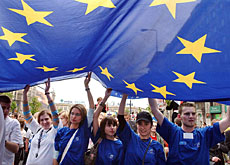Cohesion Fund “benefits both sides”

The government has launched its campaign supporting closer cooperation with eastern Europe, two months ahead of a national vote on the subject.
The central issue is the SFr1 billion ($800 million) Switzerland has pledged to the ten new EU member states. The government said this is a “good investment” that will benefit not only the new EU states but also Switzerland.
The vote, which will take place on November 26, was forced by the rightwing Swiss People’s Party, which announced in July that it had succeeded in gathering the 50,000 signatures required for a referendum.
On Tuesday, during the autumn parliamentary session in the mountain resort of Flims, Swiss Foreign Minister Micheline Calmy-Rey said nothing less than Switzerland’s role in Europe was at stake.
“Switzerland is able to contribute to a stable Europe from which it could benefit in many respects in return,” she said, describing the contribution to the Cohesion Fund as an investment in the success of bilateral talks and an important condition for an effective policy towards the EU.
Economics Minister Doris Leuthard highlighted the economic benefits of closer cooperation, saying Switzerland already benefited from cooperation with eastern countries to the tune of several billion francs and a Yes in the vote on November 26 would open the supply agreement door even wider.
“A No on the other hand would destroy much goodwill and harm Swiss economic interests,” she warned.

More
Referendum
No additional debt
The final cabinet minister who presented the government’s campaign was Finance Minister Hans-Rudolf Merz.
Merz said the government had solved the tricky issue of financing the contribution without imposing new taxes or running up additional debt.
He admitted that negligible cuts would have to be made to Switzerland’s development aid, but the poorest countries would not be affected. He emphasised that Swiss taxpayers would not have to foot any additional bills.
“There will be no additional debt for the state,” he said. “The billion francs is well-invested money.”
On Wednesday, a broad alliance of political parties – with the exception of the People’s Party – called on voters to vote yes in November, repeating the arguments made by the cabinet ministers.
Alliance Sud, the umbrella organisation of Swiss development agencies, is also backing the government position, saying the SFr1 billion would improve lives in eastern Europe, but warned that the financial contribution should not come at the expense of federal funding for development.
Switzerland has no formal agreement with the European Union. Instead, there is a memorandum of understanding that sets out the general conditions of the Swiss commitment to the ten new EU member states.
The EU Commission’s president, José Manuel Barroso has already warned Switzerland that a rejection of the move would send a wrong signal to the new members.
swissinfo with agencies

More
Alliance Sud
Switzerland has been granting financial aid to countries in eastern Europe to help them transform into market economies.
As part of the second set of bilateral treaties with Brussels, non-EU member Switzerland pledged to provide SFr1 billion to ten new EU member states mainly in eastern Europe.
Under the accord, almost half the funding will go to Poland. Hungary will benefit to the tune of SFr131 million, while the Czech Republic will receive SFr110 million.
The EU’s Cohesion Fund is a structural instrument that has helped member states reduce economic and social disparities and stabilise their economies since 1994.
The funding will come mainly from cuts in aid programmes run by the foreign and economics ministries.
Breakdown of Swiss contribution to EU cohesion fund in Swiss francs:
Poland: 489,020,000
Hungary: 130,738,000
Czech Republic: 109,780,000
Lithuania: 70,858,000
Slovakia: 66,866,000
Latvia: 59,880,000
Estonia: 39,920,000
Slovenia: 21,956,000
Cyprus: 5,988,000
Malta: 2,994,000

In compliance with the JTI standards
More: SWI swissinfo.ch certified by the Journalism Trust Initiative












You can find an overview of ongoing debates with our journalists here . Please join us!
If you want to start a conversation about a topic raised in this article or want to report factual errors, email us at english@swissinfo.ch.